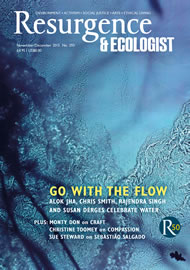Mindfulness – the practice of paying attention to things as they are, with acceptance and self-compassion, in the present moment – has captured popular imagination in recent years. A quiet and persistent stream of publications has ensued on the subject, from clinicians’ guides to mindfulness for good mental health, to self-help programmes designed to alleviate some of the stress and busyness of modern life.
Leaping Hare Press’s beautifully produced series of books signals a new departure in the proliferation of mindfulness texts. With handsome woodblock print covers, and titles such as The Art of Mindful Baking and Einstein and the Art of Mindful Cycling, writers offer personal meditations upon the value of stillness and reflection amidst the quixotic possibilities of daily life.
In Galileo and the Art of Ageing Mindfully, Leaping Hare regular and retired Anglican priest Adam Ford reflects upon a lifelong passion – stargazing – and the experiences of ageing and retirement that have recently furnished him with more leisure for the night sky. Now in his seventies, Ford describes retirement as a time of life when the likely brevity of the future and vast landscape of the past can combine to weigh upon a person’s energies, habits and outlook. Yet comfort and direction can arise, he suggests, through watching the stars, contemplating the great distances of time and space between them, and observing the marvellous discoveries of Galileo playing out in the vast darkness above our axis-turning Earth.
Above all, Ford advocates curiosity as a seminal life force that peps up even the quietest of retirements. To perceive a star on the horizon inching its way heavenwards, moment by moment, and know simultaneously that it is the Earth creeping quietly in the opposite direction, ignites the capacity to “awake for the moment with a sense of wonder”. From curiosity arise context, history and depth: contemplating the legacy of light years that lie between the stars and ourselves offers a vibrant sense of the universe’s timescale. The chaos theory that renders the future magically unpredictable gives us permission to be “creative with the time available”: to shake an old habit, or adopt a new passion.
Combining a sense of the spiritual with the scientific, Ford suggests that knowledge of the stars culminates in a sense of wholeness. Just as Galileo demonstrated that the Earth orbits the sun, rather than the other way round; and just as the haemoglobin in our blood was forged in the heart of emerging stars, part of Ford’s message is that far from standing alone or being most important, we are interconnected with each other and the universe in ways that go back to the dawn of time. It is this that he wishes to pass on to his grandchildren: that while we each abide at the centre of our own worlds, our moral compass rests in our capacity to hold the multiplicity of worlds in conscious awareness.
With meditations on gravity, the turning Earth, and letting go, Ford offers a personal synthesis of ideas on mindfulness, curiosity, ageing and stargazing. Part of the joy of growing older, he says, is in “letting go of certainties and living without answers”: but it’s a powerful thing to ask questions, and to contemplate those of centuries past.







